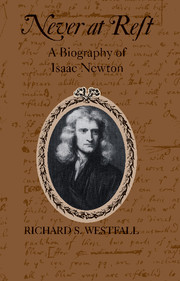Book contents
- Frontmatter
- Contents
- Preface to the paperback edition
- Preface
- Acknowledgments
- A note about dates
- Abbreviations used in footnotes
- 1 The discovery of a new world
- 2 A sober, silent, thinking lad
- 3 The solitary scholar
- 4 Resolving problems by motion
- 5 Anni mirabiles
- 6 Lucasian professor
- 7 Publication and crisis
- 8 Rebellion
- 9 Years of silence
- 10 Principia
- 11 Revolution
- 12 The Mint
- 13 President of the Royal Society
- 14 The priority dispute
- 15 Years of decline
- Bibliographical essay
- List of illustrations
- Index
- General index
6 - Lucasian professor
Published online by Cambridge University Press: 05 June 2013
- Frontmatter
- Contents
- Preface to the paperback edition
- Preface
- Acknowledgments
- A note about dates
- Abbreviations used in footnotes
- 1 The discovery of a new world
- 2 A sober, silent, thinking lad
- 3 The solitary scholar
- 4 Resolving problems by motion
- 5 Anni mirabiles
- 6 Lucasian professor
- 7 Publication and crisis
- 8 Rebellion
- 9 Years of silence
- 10 Principia
- 11 Revolution
- 12 The Mint
- 13 President of the Royal Society
- 14 The priority dispute
- 15 Years of decline
- Bibliographical essay
- List of illustrations
- Index
- General index
Summary
POSSIBLY the fact that the university closed down for the better part of two years, freeing Newton from control and supervision, aided his unorthodox program of study. Such was the progressive decomposition of the established curriculum, however, that it is far from clear that his intellectual development would have differed in any respect had the plague not intervened. While the requirements prescribed an impressive array of lectures, disputations, and acts over a three-year period before a Bachelor of Arts might be admitted as an inceptor for the Master of Arts degree, most of them had ceased to be operative by the Restoration, as repeated orders from Westminster that they be observed testify. Even residence had ceased to be required. Though Newton himself was not frequently absent from Cambridge once he returned after the plague, the college Exit and Redit Book reveals that other scholars of the house felt free to come and go as they pleased, even in term time. Newton's friend Wickins, for example, who was a scholar drawing a stipend, left the college on 15 October 1667 and did not return until the middle of January. Unorthodox study was not manifestly worse than no study at all. The one discipline exerted was financial; Newton received his stipends through his tutor. Although his papers do not indicate that he again made any gestures whatever toward the established curriculum, his academic career nevertheless marched through the remaining stages to full membership in the college and university without hesitation.
- Type
- Chapter
- Information
- Never at RestA Biography of Isaac Newton, pp. 176 - 237Publisher: Cambridge University PressPrint publication year: 1981



